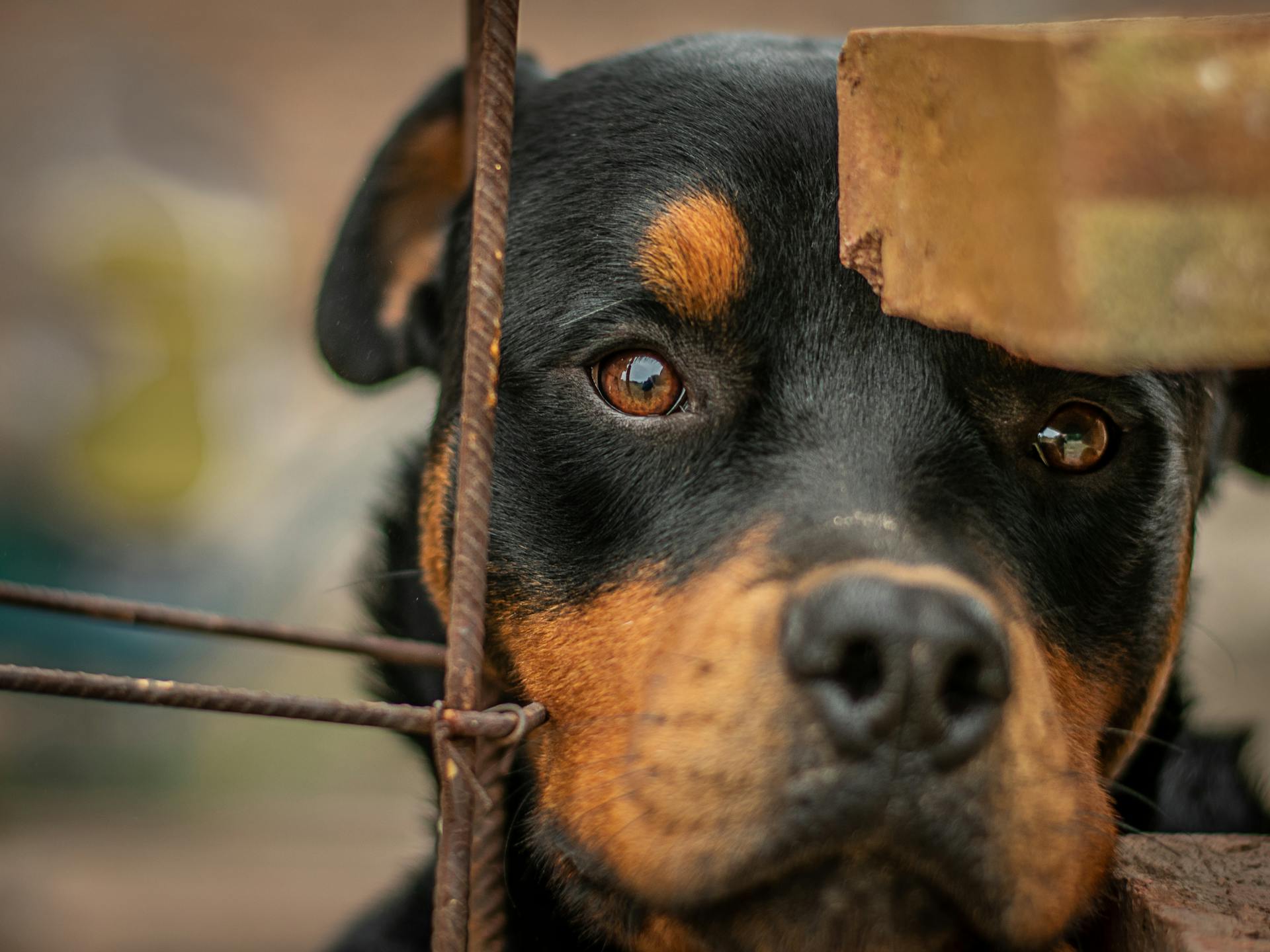
There is no single, nationwide ban on pit bulls in the United States. However, some cities and states have implemented breed-specific legislation (BSL) that restricts or prohibits the ownership of pit bulls.
Many people are unaware that some cities and states have laws that specifically target pit bulls. For example, Miami-Dade County in Florida has a ban on pit bulls that has been in place since 1989.
Some cities have enacted BSL in response to high-profile dog attacks, while others have done so due to concerns about public safety.
For more insights, see: Colorado Ban on Pit Bulls
Arguments for BSL
BSL makes communities safer by regulating breeds with a genetic propensity to attack and inflict severe injuries, like pit bulls, which can result in severe injury or even death from their first bite.
Data shows that between 2005 and 2019, there were at least 521 dog bite-related deaths in the US, with 346 attributed to pit bulls.
Enacting BSL can prevent dog attacks before they happen, as first attacks by breeds like pit bulls almost always result in severe injury.
Intriguing read: American Pit Bull Terrier Female
In Prince George's County, Maryland, BSL led to a 43% decrease in overall dog bites and a 35% decrease in pit bull bites just 14 years after its enactment.
By banning breeds with a history of aggression, BSL can save lives and make communities safer for humans and animals alike.
Breed-Specific Laws
Breed-specific laws are a topic of much debate, but what exactly are they? In the United States, breed-specific legislation chiefly targets pit bulls, the premier fighting breed. This class of dogs is comprised of several breeds: American pit bull terrier, American Staffordshire terrier, and Staffordshire bull terrier.
Pit bulls are the most common and negatively impact communities the most, which is why they're the focal point of breed-specific legislation. Much less commonly, breed-specific ordinances target rottweilers, the second most lethal dog breed in the United States.
In some cities, breed-specific laws are enforced as you go, meaning authorities take action as they become aware of infractions or as complaints are received. For example, San Francisco issues a "Fix It" ticket when a person is caught having an unaltered pit bull.
If this caught your attention, see: Laws on Pit Bulls in Texas
The model for most cities is to issue warnings and citations to owners found in violation of the local animal control regulations. Routine duties for animal control officers include patrolling assigned areas, responding to at-large and dangerous dogs complaints, and carrying out animal bite investigations.
There are currently 22 states that have adopted state preemption anti-BSL laws, which bar local governments from regulating specific dog breeds. These laws were historically pursued by big industry interests, such as the tobacco industry.
In the UK, it's against the law to own certain types of dog, including pit bull terriers, Japanese tosa, dogo argentino, and fila brasileiro. XL Bully dogs are also banned in England and Wales.
Here's a list of banned breeds in the UK:
- Pit Bull Terrier
- Japanese Tosa
- Dogo Argentino
- Fila Brasileiro
Pit bull owners, kennel clubs, humane, and veterinarian groups often use scare tactics in their fight against breed-specific laws, claiming that if pit bulls are banned, "your breed will be next." However, as Tom Skeldon, the former Lucas County, Ohio Dog Warden, highlights, this is just a scare tactic.
Related reading: Largest Breed of Pit Bulls
Do Laws Work?
Breed-specific laws, like those in Aurora, Colorado and Pawtucket, Rhode Island, have been shown to dramatically reduce pit bull attacks on people and pets.
After Aurora adopted a pit bull ban ordinance in 2005, attacks by pit bulls decreased 73% from 2005 to 2014. In Pawtucket, the city released 13 years of bite data showing that in the 4 years leading up to the ban, there were 52 pit bull attacks on people, but in the 10 years after the ban, there were only 13.
Cities that have successfully implemented breed-specific laws often see a significant reduction in vicious dog designations, as well as a decrease in pit bull euthanasia. In Aurora, for example, pit bull euthanasia dropped 93% after the ban.
Here are some examples of cities that have seen excellent outcomes after implementing breed-specific laws:
These cities demonstrate that breed-specific laws can be an effective tool in preventing dog attacks and making communities safer.
Legislative and Constitutional Issues
Breed-specific legislation has been upheld in court numerous times. In fact, at least eight U.S. State Supreme Courts have agreed that such laws are constitutional, including those in Arkansas, Colorado, Iowa, Kansas, Ohio, Utah, Washington, and West Virginia.
The U.S. Supreme Court has also refused to hear appeals, effectively declaring breed-specific ordinances constitutional. This happened in the case of City of Toledo v. Tellings, where the Supreme Court of Ohio's decision was not challenged further.
Even proponents of breed-specific legislation have been known to misrepresent the law. For example, a Washington state legislator falsely claimed that a 1920 U.S. Supreme Court decision found breed-specific ordinances unconstitutional.
Constitutional?
The U.S. Supreme Court has refused to hear an appeal of the Supreme Court of Ohio's decision in City of Toledo v. Tellings, declaring Toledo's breed-specific ordinance constitutional.
At least eight U.S. State Supreme Courts have upheld the constitutionality of breed-specific legislation, including Arkansas, Colorado, Iowa, Kansas, Ohio, Utah, Washington, and West Virginia.

In 2015, a Washington state legislator falsely stated that a U.S. Supreme Court decision in 1920, Nicchia v. New York, found it unconstitutional to have breed-specific ordinances.
The fact is, the Nicchia v. New York decision relies on the U.S. Supreme Court decision in Sentell v. New Orleans & Carrollton R. Co. - 166 U.S. 698 (1897), which determined that government officials could shoot and kill loose dogs that pose a danger to the community.
Nearly a dozen federal courts have weighed in favorably on the constitutionality of breed-specific laws, most recently the Eighth Circuit Court of Appeals.
At least seven State Appeals Courts have also upheld the constitutionality of breed-specific legislation, including courts in Florida, Kansas, Kentucky, Missouri, New Mexico, Ohio, and Wisconsin.
State Preemption Laws
State preemption laws are a complex issue, and it's essential to understand them if you're a dog owner or advocate. State preemption laws bar local governments from regulating specific dog breeds, such as pit bulls.
See what others are reading: Dog Breeds Banned
These laws were first introduced in the late 1980s and have been driven by big industry interests, including dog breeders and tobacco companies. Wave I of these laws ended in 1992, but Wave II began in 2012 and is ongoing today.
Currently, 22 states have adopted state preemption laws, which primarily center on the prohibition of declaring a specific breed "dangerous" or "vicious". California is a mixed preemption state, allowing for the regulation of specific breeds via spay, neuter status, but prohibiting specific breeds to be declared "potentially dangerous" or "vicious".
These laws can be superseded by home rule authority, but the specifics vary among states. In Colorado, for example, jurisdictions can supersede the preemption law under home rule authority.
Big industry interests are the primary force behind state preemption laws, which can be detrimental to grassroots public health movements.
Consider reading: Big Pit Bulls
Implementation and Enforcement
Cities often enforce breed-specific laws through a method called "enforce as you go", where authorities take action as they become aware of infractions or receive complaints.
This approach allows officers to check for ordinance violations during their everyday duties, such as patrolling assigned areas and responding to complaints about at-large or dangerous dogs.
In San Francisco, for example, a "Fix It" ticket is issued when an unaltered pit bull is caught, giving the owner two weeks to sterilize the dog, after which a $500 fine is imposed if proof of surgery is not provided.
Routine duties for animal control officers include responding to complaints and carrying out investigations, which helps to identify and address ordinance violations.
The chosen method of enforcement can impact the cost of enforcing a breed-specific law, with some jurisdictions seeing no negative effect on their budget.
In Council Bluffs, Iowa, the animal control department did not see a negative impact on its budget after enacting a pit bull ban in 2004, as the duties of enforcing the ordinance were woven into their everyday duties.
Larger cities may use increased registration fees for restricted breeds to offset the costs of enforcement, as seen in Aurora, Colorado, where the higher registration fees for restricted breeds covered much of the day-to-day costs of enforcement.
You might like: Pit Bulls Should Not Be Banned
Pit Bull Regulation
In the UK, pit bull terriers are banned, along with three other breeds. In England and Wales, XL Bully dogs are also banned, and it's against the law to sell, abandon, or breed from these dogs.
In the US, breed-specific laws target pit bulls in 97% of cities that regulate specific dog breeds. Rottweilers are the second most regulated breed, named in 12% of ordinances.
Here's a breakdown of the top breeds targeted by breed-specific laws in the US:
It's worth noting that breed-specific legislation is often targeted at pit bulls specifically, rather than other breeds, due to their high incidence of bites and severe injuries.
Visual Breakdown
Pit bulls are the most regulated breed in the US, with 97% of cities that have breed-specific laws targeting them.
Out of 1160 cities with such laws, 97% specifically name pit bulls, leaving little room for other breeds to be targeted.
Rottweilers are the second most regulated breed, but they're still a far cry from the popularity of pit bulls, with only 12% of cities naming them in their ordinances.
You might enjoy: Laws on Pit Bulls in California
Wolf-dog hybrids are also commonly regulated, making up 11% of cities with breed-specific laws.
The data shows that pit bulls are the clear winner when it comes to breed-specific regulations.
Here's a breakdown of the top breeds targeted by cities with breed-specific laws:
These numbers are staggering, and it's clear that pit bulls are the breed that cities are most concerned about.
Will My Dog Be Regulated?
Pit bull owners, kennel clubs, humane and veterinarian groups often use scare tactics in their fight against breed-specific laws, claiming that if pit bulls are banned, "your breed will be next." This is a tactic that has been used for decades, as highlighted by Tom Skeldon, the former Lucas County, Ohio Dog Warden, who notes that despite 13 years of breed-specific legislation, other breeds have not been targeted.
The truth is that 97% of breed-specific laws are targeted at pit bulls, with rottweilers making up only 12%. This means that the likelihood of your German shepherd, or any other breed, being regulated is extremely low.
Communities enact breed-specific legislation because a small percentage of pit bulls inflict a disproportionate number of bites, often resulting in severe injuries. This is not due to the breed itself, but rather the selective breeding for illegal dogfighting that has produced a dog with a unique bite style and attack traits.
Pit Bulls: To Ban
In the UK, owning a Pit Bull Terrier is against the law. It's a banned breed in England and Wales.
You can't sell, abandon, or give away a Pit Bull Terrier, as it's a banned dog. Breeding from a Pit Bull Terrier is also against the law.
The ban on Pit Bull Terriers is based on what the dog looks like, rather than its breed or name. So, if your dog matches many of the characteristics of a Pit Bull Terrier, it may be a banned type.
In the UK, if you own an XL Bully dog, you need a valid Certificate of Exemption. It's your responsibility to prove your dog is not a banned type.
Here are the banned breeds in the UK:
- Pit Bull Terrier
- Japanese Tosa
- Dogo Argentino
- Fila Brasileiro
Note that XL Bully dogs are also banned in England and Wales.
Origin of Legislation
Breed-specific legislation has a long and complex history. It first emerged in the early 1980s in response to pit bull attacks.
Pit bulls were initially called bulldogs or bull terriers, and cities began enacting breed-specific ordinances in the late 19th and early 20th centuries. Cities like Sacramento, CA, Richmond, VA, and Washington DC were among the first to regulate or ban pit bulls.
The first recorded mention of a pit bull attack was in 1844, where a bull terrier was described as "ferocious" and "fierce." Its owner had little control over the dog, and it was only through the use of force that the dog was restrained.
By the mid 1900s, pit bulls were still a concern, with attacks being just as violent as they are today. Cities continued to regulate or ban pit bulls, with some banning them outright by 1912.
A different take: Denver and Pit Bulls
Geographic Restrictions
In England and Wales, owning an XL Bully dog requires a valid Certificate of Exemption, and it's your responsibility to prove your dog is not a banned type.
Some states in the USA have Breed Specific Legislation (BSL) on the books, which often targets pit bulls, Rottweilers, and Dobermans. Most states have BSL-enforced laws, but a few states like California, Colorado, Texas, Illinois, and Florida prohibit BSL or breed-discrimination.
To determine if a state allows pit bulls, check if it has laws prohibiting BSL or breed-discrimination. States like Alaska, Arizona, Connecticut, Hawaii, Maine, Massachusetts, Minnesota, Nevada, New Hampshire, New Jersey, New York, Oklahoma, Pennsylvania, Rhode Island, South Dakota, Utah, and Virginia allow pit bulls.
If you're planning to move with your pit bull, research the city or municipality you're moving to, as some have BSL laws that ban pit bulls. Iowa has over 90 municipalities with BSL, making it one of the unfriendliest states for pit bulls.
A different take: Which States Banned Pit Bulls
Bully Dogs in England and Wales
In England and Wales, owning certain types of dog is against the law.
These banned breeds include Pit Bull Terrier, Japanese Tosa, Dogo Argentino, and Fila Brasileiro. XL Bully dogs are also banned in these areas.
If your dog looks like a banned breed, regardless of its name, it may be considered a banned type. For example, if your dog matches many of the characteristics of a Pit Bull Terrier, it may be a banned type.
You can't sell, abandon, or give away a banned dog in England and Wales. Breeding from a banned dog is also against the law.
If you own an XL Bully dog in England and Wales, you'll need a valid Certificate of Exemption. It's your responsibility to prove your dog is not a banned type.
Here are the banned breeds in England and Wales:
- Pit Bull Terrier
- Japanese Tosa
- Dogo Argentino
- Fila Brasileiro
- XL Bully
What States Don't Allow Pit Bulls
Most states in the USA have Breed Specific Legislation, or BSL, on the books, which often targets pit bulls.
Some states have laws prohibiting BSL or breed-discrimination, such as California, Colorado, Texas, Illinois, and Florida.
Alaska, Arizona, Connecticut, Hawaii, Maine, Massachusetts, Minnesota, Nevada, New Hampshire, New Jersey, New York, Oklahoma, Pennsylvania, Rhode Island, South Dakota, Utah, and Virginia have either prohibited BSL or don't enforce it.
Utah has prohibited local governments from making their own BSL, thus protecting dog-owners and dogs from unfair and inconsistent laws.
Frequently Asked Questions
What is the new pitbull law?
Florida's new law, effective Oct. 1, prohibits public housing authorities from banning dogs based on breed, weight, or size, effectively lifting breed-specific restrictions statewide.
Why should pitbulls not be banned?
Pitbulls are highly trainable and can form strong bonds with their owners, making them a loving and loyal companion. Banning them is unnecessary, as proper training and socialization can overcome any potential concerns.
What happened to pitbulls when they got banned?
When pitbulls were banned, owners were required to neuter their dogs and register them with a tattoo and microchip. This was the only way to keep their pets under the new legislation.
Sources
- https://www.procon.org/headlines/pit-bull-bans-top-2-pros-and-cons/
- https://www.gov.uk/control-dog-public/banned-dogs
- https://www.dogsbite.org/legislating-dangerous-dogs-bsl-faq.php
- https://petset.com/what-states-dont-allow-pit-bulls/
- https://rochestermedia.com/pit-bulls-to-ban-or-not-to-ban-that-is-the-question/
Featured Images: pexels.com


